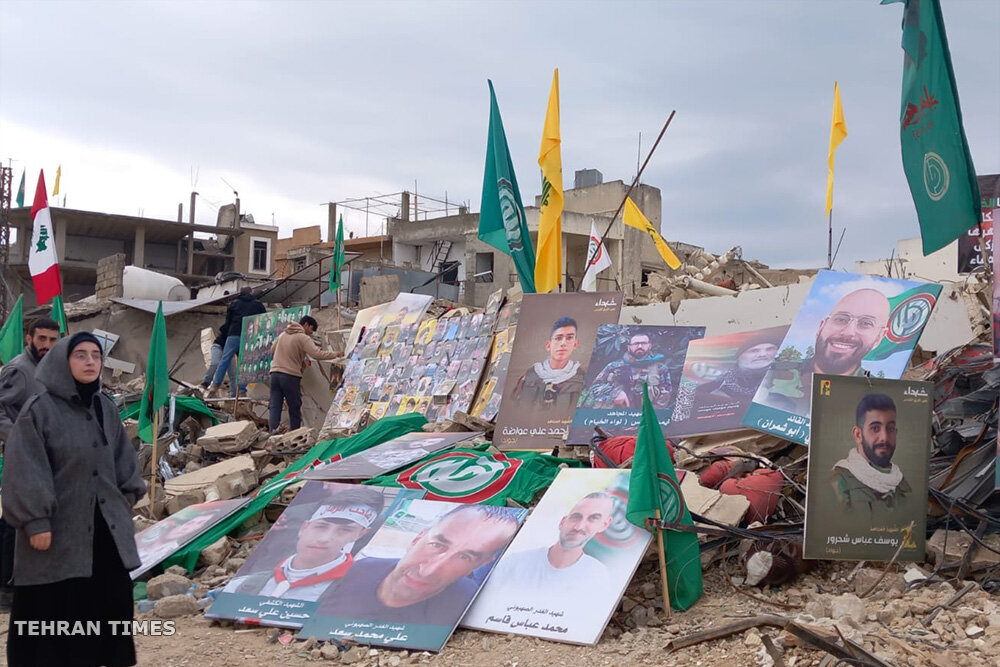Lebanese return to border villages but settlers refuse

KHIAM – Up to the time of writing this report at least 15 citizens including a soldier in the Lebanese army were martyred and dozens more were injured as Israeli invaders attacked southerners returning to their towns and villages after the expiration of the 60-day deadline for the withdrawal of the invading army. The occupation forces also kidnapped other citizens. No official figures released yet.
The Israeli occupation forces opened fire on the armless citizens who stood directly in front of the Merkava tanks, amidst intensive patrols by the UNIFIL forces that blocked the roads to prevent them from advancing to their border towns.
The citizens went out in defiance of the threats by Avichay Adraee, the spokesman for the Israeli army. In parallel, the Lebanese army urged them to “adhere to the directives of the military units.”
President Joseph Aoun expressed his jubilation along the southerners, stressing that Lebanon’s sovereignty and territorial integrity are “non-negotiable.” Aoun said that he is following up – at the highest levels – the return of the displaced citizens and “guarantee their rights and dignity.”
Parliament Speaker Nabih Berri also said, “Today you are proving – far and near – that you are great in your national affiliation,” adding that “the blood and wounds of the defenseless southern Lebanese constitute an explicit and urgent call to the international community and the countries sponsoring the ceasefire agreement to take immediate and urgent action to compel Israel to withdraw immediately from the Lebanese territories it still occupies.”
In turn, caretaker Prime Minister Najib Mikati stressed that the southerners’ patriotism “has become an example to be followed and a testimony – written in blood – that no right is lost if there are demands behind it.” He warned that “any retreat from the commitment to the provisions of the ceasefire agreement will have dire consequences.”
Nawaf Salam, the prime minister-designate, also confirmed his commitment to “the priority of securing the conditions for rebuilding these villages.”
Hezbollah MP Ali Fayyad described the return of the southerners as a completely historic moment of change, “just as the mujahideen and martyrs changed the course of the war; the people are breaking the equations that the Israeli enemy sought to establish.”
Meanwhile, it seems that the return of the colonial settlers to north Palestine will require huge efforts by Israel’s security and political leadership as they have lost their confidence in them following an unprecedented displacement process in the history of the occupying entity, according to a study conducted by the Union Center for Research and Development.
The Lebanese think tank highlights the “inferiority” that these occupiers suffer from compared to other colonial settlers in occupied Palestine and this will leave serious repercussions in the long run. Hence, promises to convince them to return will be of no use, given their previous experiences in this regard.
It further reveals that more than 13,000 northern Israeli settlers are still living in hotels and houses funded by the occupation entity. About 50,000 others have permanently integrated into the communities to which they have taken refuge, bringing the total number of those who refuse to return – two months after the end of the war – to 63,935.
The study warns against emptying the north so that it becomes a soft underbelly that helps Hezbollah; among the colonial settlers’ prime demands are: establishing a buffer zone in southern Lebanon; launching an asymmetric military operation in the event Hezbollah violates the ceasefire agreement; building new advanced shelters in conjunction with a comprehensive development plan; not postponing immediate financial compensations; supporting and developing the health sector; etc.
The Union Center for Research and Development points out that the occupied northern Palestine has undergone structural changes that will have strategic repercussions, as it has transformed from a tourism and entertainment center into a strategic “defense line” for the depth of the colonial entity, which will constitute a huge economic burden on the occupation entity’s budget.
Leave a Comment